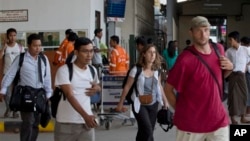The U.S. is calling on the government in Burma, also known as Myanmar, to allow international aid groups to return to the volatile western state of Rakhine.
All international aid groups, as well as U.N. workers, were evacuated from the region last week after mobs attacked buildings belonging to a foreign aid group.
U.S. Embassy spokesperson Andrew Leahy told VOA Thursday that while Washington wants to see travel restrictions lifted, simply allowing aid workers to return to Rakhine is not enough.
"I think what we've seen repeatedly in Rakhine State is an environment that has been a difficult to operate in environment for the humanitarian aid workers and the international NGOs. Particularly those providing services to vulnerable populations. And I think we want to make sure these organizations have the security they need to provide this vital humanitarian assistance."
Meanwhile, the U.N. Office for the Coordination of Humanitarian Affairs (UN-OCHA) says it is concerned about the humanitarian impact on people in Rakhine State. Spokesperson Pierre Peron told VOA that he has already seen an impact on people in Rakhine.
"Nearly 15,000 children in IDP camps who no longer have access to psycho-social support. Even more worrying, we see there are 300 children with severe, acute malnutrition in Sittwe that usually get lifesaving treatment are not getting that anymore. And so their lives are at risk. We also know that over the next two weeks we need to distribute more than 1,000 metric tons of food to the camps."
Burmese officials have said violence broke out last week after a worker for Malteser International took down a Buddhist flag in front of the group's facility in the town of Sittwe. Buddhists had placed flags in the village as part of a protest against the mainly Muslim Rohingya minority group.
Buddhist-Muslim violence erupted in Rakhine state in 2012 and has since spread to other parts of the country. The sectarian fighting has killed at least 240 people and displaced 140,000 others, mainly Rohingya Muslims, who are called Bengali by the Burmese government.
(This report was produced in collaboration with the VOA Burmese service.)
All international aid groups, as well as U.N. workers, were evacuated from the region last week after mobs attacked buildings belonging to a foreign aid group.
U.S. Embassy spokesperson Andrew Leahy told VOA Thursday that while Washington wants to see travel restrictions lifted, simply allowing aid workers to return to Rakhine is not enough.
"I think what we've seen repeatedly in Rakhine State is an environment that has been a difficult to operate in environment for the humanitarian aid workers and the international NGOs. Particularly those providing services to vulnerable populations. And I think we want to make sure these organizations have the security they need to provide this vital humanitarian assistance."
Meanwhile, the U.N. Office for the Coordination of Humanitarian Affairs (UN-OCHA) says it is concerned about the humanitarian impact on people in Rakhine State. Spokesperson Pierre Peron told VOA that he has already seen an impact on people in Rakhine.
"Nearly 15,000 children in IDP camps who no longer have access to psycho-social support. Even more worrying, we see there are 300 children with severe, acute malnutrition in Sittwe that usually get lifesaving treatment are not getting that anymore. And so their lives are at risk. We also know that over the next two weeks we need to distribute more than 1,000 metric tons of food to the camps."
Burmese officials have said violence broke out last week after a worker for Malteser International took down a Buddhist flag in front of the group's facility in the town of Sittwe. Buddhists had placed flags in the village as part of a protest against the mainly Muslim Rohingya minority group.
Buddhist-Muslim violence erupted in Rakhine state in 2012 and has since spread to other parts of the country. The sectarian fighting has killed at least 240 people and displaced 140,000 others, mainly Rohingya Muslims, who are called Bengali by the Burmese government.
(This report was produced in collaboration with the VOA Burmese service.)





